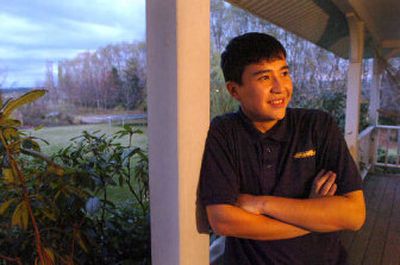Exchange student ‘outgoing, full of questions’

The trees took Nurbek Jumayev by surprise when he arrived in Idaho. In Uzbekistan, a landlocked country of rolling deserts, acres of pine trees is something he just wouldn’t see.
The 17-year-old exchange student discovered another startling thing while riding a bicycle through his host family’s neighborhood. Americans don’t walk much. He lost his way, and not a soul was outside to help him with directions.
“In my country, if you look to the streets, there’s more people walking in the sidewalks,” he said. “I didn’t meet anybody for about a half an hour. Finally, I went to Super One.”
At the grocery store, everyone was friendly and polite, as is everyone that Jumayev has met since arriving in August. He attends North Idaho Christian School and will live with the Leonardi family in Hayden until summer. Host mother Mary Jane finds her new “son” to be outgoing and full of questions.
“I think he has a lot of potential,” she said.
Jumayev was selected as one of 1,000 applicants from his country to be part of the Future Leaders Exchange Program. The best and brightest from the countries of the former Soviet Union come to the United States to learn more about democracy. These likely future leaders must undergo a series of essays, English tests and interviews to earn a spot in the program.
“It was very stressful, getting prepared,” Jumayev said. “Almost every day I was training and writing essays.”
Travel expenses and students’ stipends are funded through the U.S. Department of State along with contributions from the private sector. The Pacific Intercultural Exchange program that arranged Jumayev’s stay is one of the nonprofit programs to receive grants for monitoring placements.
Although Jumayev studied English since sixth grade, he wasn’t accepted into the FLEX program when he applied two years ago. He began taking conversational language lessons in his country with “awesome” teachers from Canada and North Carolina, he said. That helped, and he earned his trip, but the adjustment to America remained a challenge.
“The first couple weeks my talking was only questions,” he said. “I ask everything. ‘Why is this?’ and ‘What is this?’ “
He’s become more comfortable with the language, along with the essence of democracy. Through his school’s government class he’s learned to recite the U.S. Constitution preamble and has grasped the meaning of the right to “bear arms,” which doesn’t translate easily.
FLEX program students are required to become involved in their adopted community through volunteer work and attendance at city planning and school board meetings. For his stipend of spending money, Jumayev has pruned trees in his schoolyard and limed soccer fields. He’s offered to tutor students in math, since it’s a favorite subject. His mother in Uzbekistan is a math professor, and his father is a police officer.
Uzbekistan lies just north of Afghanistan and has had the same president since 1991, when it became independent from the Soviet Union. The country is slightly larger than California with a population of 26.8 million. Back home, Jumayev’s school is in session six days per week. He loves his new school’s three-day weekends.
“Here are less subjects and less homework,” he said.
He appreciates the free time but is an eager student. When asked to name his favorite subject he said, “All of them. Can I only choose one?”
This enthusiasm has endeared Jumayev to local PIE coordinator Karen Young.
“He’s just the most adaptable and flexible kid,” she said. “He wants to participate in everything.”
Jumayev was first to sign on when Young asked if her local exchange students would decorate a tree for the Kootenai Medical Center Foundation’s Festival of Trees fund-raiser. Last year a tree was entered representing the various homelands, and this year’s students agreed to do the same.
Uzbekistan is 88 percent Muslim, so Christmas isn’t celebrated, yet Jumayev describes “New Year’s trees,” which are decorated with Santa Claus ornaments, glass balls and a star. He’s learning how American holidays differ from his traditional family gatherings, where sport is often a part of celebration. That includes wrestling matches and “kupkari,” where horseback riders compete for a goat carcass.
Another surprising lesson for Jumayev was that square dancing is not as boring as he thought it would be. He joined his host sister at a dance recently and found it “really complicated.”
“I so enjoyed it,” he said. “I wish it would be every week.”
Like any normal American teen, Jumayev looks forward to the first snowfall and his first snowboarding lesson. His main objective in coming to this country was to improve his English language skills, but he expects to return home with more than that.
“I met a lot of wonderful people here,” he said. “I want to learn different ways of solving things, see the different point of view.”
In the future, he’d like a career that will mix his love of math and language in a job involved in the economy for his government. He’s come to appreciate how each culture is unique and connected with traditions.
“It’s a different way of doing, a different way of acting,” he said. “Both of them have valuable things.”